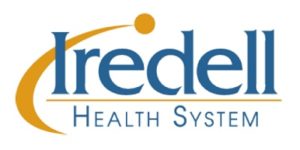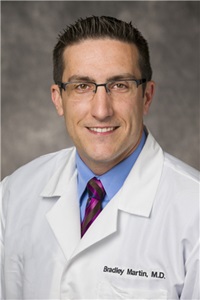
Special to IFN
Dr. Bradley Martin, a cardiologist at Statesville Cardiovascular Clinic, was in the fifth grade when he knew he wanted to pursue cardiology after his grandfather needed bypass surgery.

“My mom brought home his catheterization report that showed the different blockages he had and explained his surgery,” said Martin. “Obviously, I was very concerned about my grandfather, but it really piqued my interest. As a kid I thought, ‘They’re going to put in new pipes and he’s going to be okay.’ ”
His grandfather’s surgery was a success, and many years later Martin fulfilled his desire to become a cardiologist. Now, he spends his time helping others understand the importance of cardiovascular health.
Cardiovascular disease is complex and, for many, can be life-threatening.
“It’s multiple things, but most people conceptualize things like blockages or heart attacks that end up being cholesterol plaque that can build up in our blood vessels,” Martin said. “If those get plugged up, we start having symptoms and problems and it can snowball from there.”
Blood vessels are responsible for carrying essential nutrients to all areas of the body.
Heart attacks are the most commonly known cardiovascular concern, but cardiologists treat several other conditions, including arrhythmia and congestive heart failure.
Heart disease is the leading cause of death in the U.S.
“Most people are touched by it one way or another. We’ve heard stories of people who are sick and have ongoing issues, but also stories about that person who was young and healthy who goes out on a run, and they don’t come home. Those are scary things for people to believe, but you can start getting this plaque buildup in your 20s.”
Many people who suffer from cardiovascular disease will not experience symptoms. If they aren’t aware of genetic predisposition or their risk factors, cardiac episodes can happen when you least expect it.
“A third of the time, the first presentation of cardiovascular disease is sudden cardiac death, which is very scary,” he said.
Having a conversation with your doctor about risk factors is a great step to lower your risk of cardiovascular disease.
Controllable risk factors include:
• High blood pressure
• High cholesterol
• Tobacco use
• Poor diet
• High alcohol consumption
Some risk factors are uncontrollable and include:
• Age
• Family history
• Race and ethnicity
Your doctor can help you devise a plan, whether through lifestyle changes, medication, or a combination of both. An ounce of prevention is worth a pound of cure.
Some episodes of cardiovascular disease are unavoidable. If you are experiencing symptoms of a heart attack, call 911.
“The sooner you’re seen, the better we can help you. After eight to twelve hours, we can open a blockage, but it’s not necessarily going to save the area that was damaged. Time is muscle. No one wants to go to the ER when they don’t have to, but if you think you could be having a heart attack, that’s a little bit different than a case of bronchitis that could probably wait.”
Martin encourages his patients to take their future into their own hands.
“You have the power to control your future. The worst mistake people make is assuming they’re fine and saying, ‘I’ll see someone when there’s a problem.’ If we’re working backwards after we already have a problem, we’ve missed the opportunity. If you want to have a long-term, healthy life, it starts at a young age with good eating habits, exercise, and recognizing and controlling risk factors.”
Martin’s biggest piece of advice?
“Don’t smoke. That’s my number one. It’s never too late to quit.”
LEARN MORE
Martin is accepting new patients in Statesville, Mooresville, and Taylorsville. Talk to your primary care provider about a referral. Visit statesvillecardiovascular.com or call 704-873-1189 for more information.
Statesville Cardiovascular Clinic is a part of the Iredell Physician Network and Iredell Health System.
About Iredell Health System
Iredell Health System includes Iredell Memorial Hospital; Iredell Davis Medical Center; Iredell Davis Behavioral Health Hospital; Iredell Mooresville; Iredell Home Health; Iredell Wound Care & Hyperbaric Center; Community and Corporate Wellness; Occupational Medicine; the Iredell Physician Network and more. Iredell Memorial Hospital is the largest and only nonprofit hospital in Iredell County. The comprehensive healthcare organization has 391 licensed beds; close to 2,000 employees; and has approximately 365 healthcare providers representing various specialties. Centers of excellence include Women’s and Children’s; Cardiovascular; Cancer; Surgical Services and Wellness & Prevention. The health system’s Iredell Mooresville campus is home to the area’s only 24-hour urgent care facility, as well as an ambulatory surgery center, imaging center, rehabilitation services, and physician practices. The mission of Iredell Health System is to inspire wellbeing. For a comprehensive list of services and programs, visit www.iredellhealth.org.



